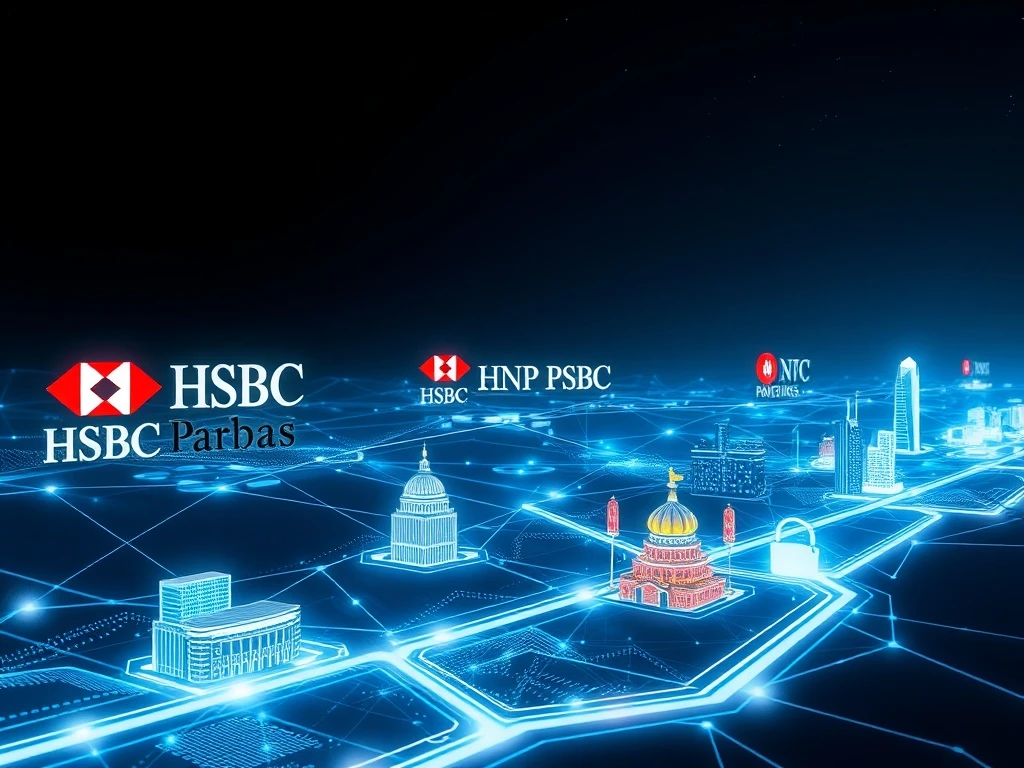RWA Tokenization: Global Banks HSBC & BNP Paribas Pioneer a Transformative Shift in Institutional Finance

The financial world stands at a critical juncture. Specifically, a groundbreaking shift towards **RWA Tokenization** is reshaping institutional finance. Two major global banks, HSBC and BNP Paribas, have now joined the Canton Foundation. This move signals a significant acceleration in the institutional adoption of real-world asset tokenization. Their involvement underscores a collective push to integrate blockchain technology into mainstream financial operations.
Unpacking the Canton Network’s Vision for Institutional Tokenization
The Canton Foundation represents the development organization behind the innovative Canton Network. This network is a blockchain designed explicitly for institutional finance. Its core focus includes **RWA Tokenization**, regulatory compliance, and interoperability across various financial systems. Furthermore, the Canton Foundation provides governance and strategic direction for the network. It actively advances blockchain-based financial use cases.
With over 30 members, the foundation’s roster now includes influential entities. Goldman Sachs, Hong Kong FMI Services, and Moody’s Ratings are recent entrants. The addition of HSBC and BNP Paribas further solidifies the network’s stature. This growing membership highlights a shared commitment to developing a robust ecosystem for tokenized assets. Ultimately, the **Canton Network** aims to create a more efficient and transparent financial infrastructure.
Global Banks Embrace Digital Assets and Blockchain Technology
BNP Paribas and HSBC’s decision to join the Canton Foundation reflects their deep commitment to adopting distributed ledger technology (DLT). Hubert de Lambilly, head of global markets at BNP Paribas, emphasized this point. He stated the move helps serve their evolving client needs. BNP Paribas’ involvement also builds on its prior backing of Digital Asset, the company behind the Canton Network. The French bank participated in Digital Asset’s $135 million funding round. This investment aims to accelerate institutional adoption and decentralized finance initiatives on Canton.
John O’Neil, HSBC’s head of **digital assets** and currencies, echoed this sentiment. He believes joining the foundation will foster the blockchain industry’s maturation. It will also support the creation of real liquidity in digital asset markets. HSBC has actively pursued various blockchain initiatives. Reports indicate it prepares to apply for a stablecoin license in Hong Kong. This aligns with the city’s new regulatory regime. HSBC Hong Kong is also exploring blockchain applications in:
- Custody solutions
- Asset tokenization
- Bond issuance
These actions demonstrate a clear strategic direction from these **global banks tokenization** efforts. They are not merely observing but actively participating in shaping the future of finance.
The Growing Momentum in RWA Tokenization
Institutional demand for tokenized real-world assets is truly shaping crypto’s 2025 narrative. This marks a sharp departure from earlier cycles. Previous bull markets in 2017 and 2021 were largely dominated by retail speculation. The World Economic Forum (WEF) recently highlighted this significant trend. It noted that the industry now benefits from a unique mix of institutions, regulators, and technology companies. These groups are working together to build trusted, interoperable frameworks. If successful, this collaboration could allow asset tokenization to fulfill its long-promised potential.
This evolving landscape signifies a maturation of the blockchain space. Financial giants are recognizing the tangible benefits of **RWA Tokenization**. They see its potential to unlock new efficiencies and liquidity. Consequently, the focus shifts towards practical applications and robust infrastructure. This collaborative effort promises to integrate digital assets more deeply into traditional financial systems.
Regulatory Frameworks and the Future of Tokenized Assets
Regulation also plays a decisive role in this expansion. In the United States, legislative progress has bolstered confidence among major financial institutions. For instance, the passage of the stablecoin-focused GENIUS Act is noteworthy. House of Representative approvals of market structure and anti-CBDC bills also contribute. These developments create a clearer, more secure environment for blockchain adoption. Initially, tokenization efforts concentrated on private credit markets and Treasury bills. However, the scope is rapidly expanding.
Experiments in equities, commodities, and energy infrastructure are currently underway. This broadens the horizon for **institutional tokenization**. Digital asset exchange Kraken, for example, has engaged with the SEC’s crypto task force. They discuss tokenization, underscoring the sector’s future ties to regulatory dialogue. Nasdaq also seeks a rule change to trade tokenized stocks. These discussions are crucial. They pave the way for a regulated and widely accepted market for **digital assets**. The convergence of technology and clear regulations is propelling this new era of finance forward.
The involvement of financial powerhouses like HSBC and BNP Paribas with the Canton Foundation marks a pivotal moment. It confirms the undeniable trajectory of **RWA Tokenization** towards mainstream adoption. As more institutions join this movement, the promise of a more efficient, transparent, and interconnected global financial system draws closer. This collaborative spirit among banks, regulators, and technology providers is setting the stage for a truly transformative era in finance.







